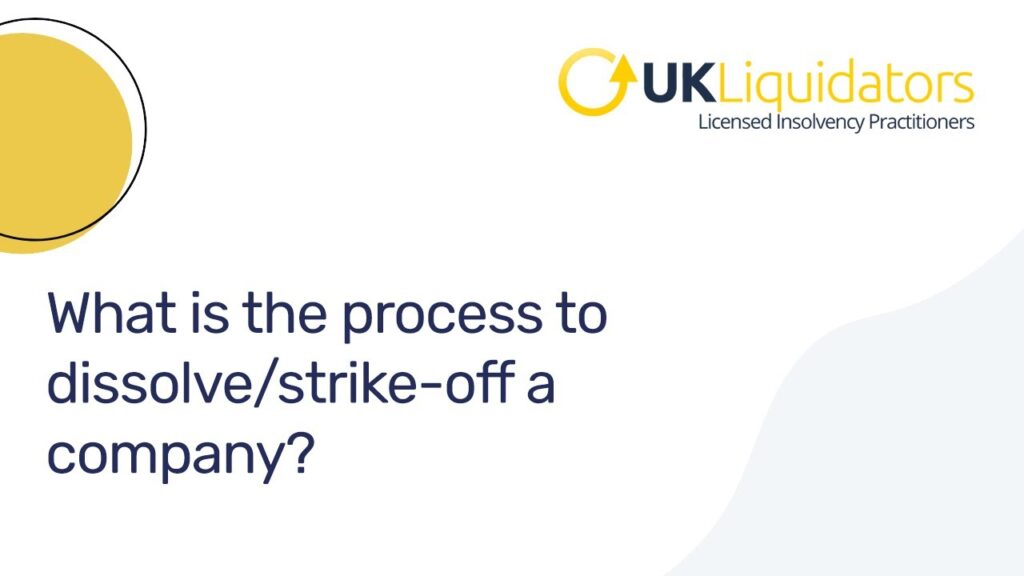Understanding Compulsory Strike Off: What You Need to Know
Understanding Compulsory Strike Off: What You Need to Know
Blog Article
Recognizing the Refine and Implications of Compulsory Strike Off Under Firm Law
In the world of company legislation, the process and ramifications of compulsory strike off hold considerable weight for businesses and their supervisors. Comprehending the ins and outs of why business face such an end result, the careful steps entailed in the strike off process, and the far-ranging implications for all parties included is critical in navigating the complex landscape of corporate administration. As we look into the reasons behind compulsory strike offs, the occurring procedures, and the subsequent effects, a clearer photo arises of the profound influence it can carry people and entities alike.
Reasons for Compulsory Strike Off
Required strike off under business legislation is initiated by the governing authorities for certain factors associated to functional or non-compliance irregularities. The key factor for a company to encounter required strike off is the failing to submit yearly returns or financial declarations for a prolonged period. This non-compliance indicates an absence of openness and adherence to regulatory demands, raising issues about the company's monetary health and wellness and liability.

Refine of Strike Off
Given the regulatory authority's initiation of obligatory strike off for different factors, comprehending the procedure of strike off is vital for companies facing possible dissolution under business law. The process usually begins with the regulatory authority sending notifications to the firm's licensed office address, informing them of the approaching strike off. It is important for the firm to deal with any exceptional concerns, such as filing overdue records or working out superior fees, within the defined timeframe to stay clear of dissolution.

Effects for Business
What are the ramifications for firms dealing with obligatory strike off under company legislation? Firms dealing with obligatory strike off may encounter several considerable ramifications. The business ceases to legitimately exist, resulting in the loss of its company status and the going along with benefits and protections. This can cause the failure to become part of contracts, conduct company, or go after legal activities in the firm's name.
Furthermore, the firm's possessions at the time of strike off become residential or commercial property of the state, which can cause financial losses for financial institutions and investors. view Investors might lose their financial investments, while creditors may have a hard time to recover any type of arrearages owed to them by the struck-off business.
Furthermore, directors of the business may encounter disqualification from holding similar positions in other firms for a specific duration (first gazette notice). This can tarnish their expert reputation and limit their future organization possibilities
Effects for Supervisors
Encountering mandatory strike off under company legislation can have serious implications for supervisors, influencing their future functions in various other firms and possibly tainting their expert standing. Directors of a business dealing with required strike off might find it testing to secure directorial placements in various other firms in the future. This is due to the fact that the strike off shows a failing to abide by lawful responsibilities, raising concerns about the director's capacity to accomplish their responsibilities effectively. Additionally, the stained expert online reputation arising from a compulsory strike off can lead to a loss of count on from business clients, partners, and stakeholders. Supervisors may likewise deal with personal economic obligations if they are located to have actually acted negligently or fraudulently, resulting in possible lawsuits against them. Generally, the effects of obligatory strike off for supervisors prolong past the certain firm concerned, influencing their career prospects and expert trustworthiness in the lengthy term.
Preventing Compulsory Strike Off

Conclusion
To conclude, comprehending the procedure and effects of required strike off under business legislation is necessary for business and directors to make certain conformity with policies. By understanding the reasons for strike off, Check This Out the procedure included, and the repercussions for all parties included, business can take steps to avoid undergoing obligatory strike off. It is essential for directors to be proactive in preserving proper records and conference statutory responsibilities to prevent the risk of strike off.
Provided the regulatory authority's initiation of required strike off for numerous factors, recognizing the process of strike off is critical for companies encountering prospective dissolution under firm legislation.What are the ramifications for companies facing mandatory strike off under business regulation?Facing obligatory strike off under company legislation can have extreme implications for directors, affecting their future functions in various other companies and potentially tainting their professional standing. Supervisors of a firm facing required strike off might locate it challenging to secure directorial settings in various other companies in the future.In conclusion, understanding the procedure and ramifications of compulsory strike off under firm regulation is vital for companies and directors to make sure conformity with regulations.
Report this page